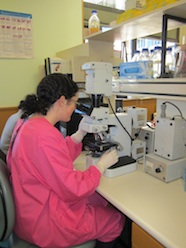Researcher profiles:
Our research will help us to identify how breast cancers can evade therapy, and to identify potential new drugs which could be used in combination with hormonal therapy to improve breast cancer treatment in the future.
Limits of current drug treatment
Most breast cancers require oestrogen to grow. Drugs called aromatase inhibitors (such as letrozole) act by preventing the production of oestrogen. They are the most effective treatment currently available for the ER (oestrogen receptor) positive type of cancer. However, these drugs do not work well for all patients.
Finding how immune cells are recruited
Our studies suggest that attracting immune cells to the cancer site may assist the cancer, and help it to grow. This project aims to identify which cells of the immune system are recruited to breast cancers during treatment. We also aim to find out how the cancer cells signal to recruit these immune cells to the tumour.
Related topics
- Immune responses in colorectal cancer
- Breast cancer: Novel genes involved in susceptibility and response

Assistant Research Fellow Jody Hazlett examines a section of breast cancer to determine the extent of immune cell infiltration.